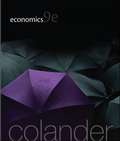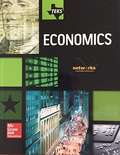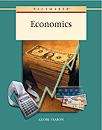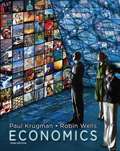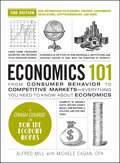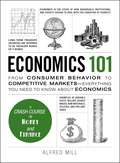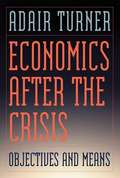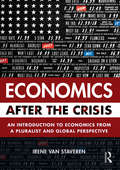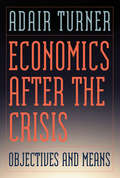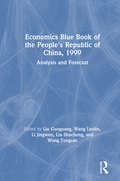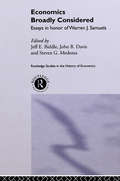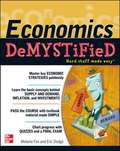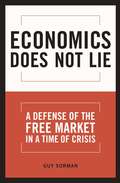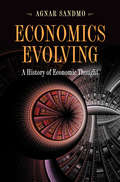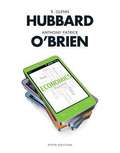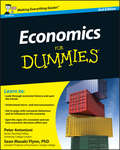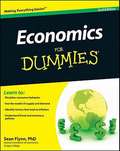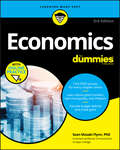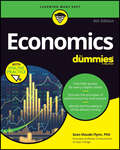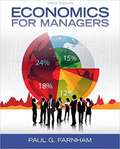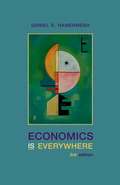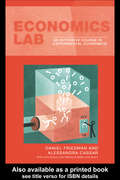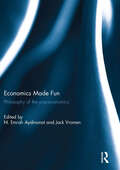- Table View
- List View
Economics (Ninth Edition)
by David ColanderThe integrated solutions for Colander's Economics 9e have been specifically designed to help today's students succeed in the principles of economics course. Colander's trademark colloquial approach focuses on modern economics, institutions, history, and modeling, and is organized around learning objectives to make it easier for students to understand the material and for instructors to build assignments within Connect Plus. McGraw-Hill's adaptive learning component, LearnSmart, provides assignable modules that help students master core topics. Significant improvements in pedagogy such as reworked end-of-chapter problems, seamless integration within the Connect Plus eBook, and instant feedback on assignments will engage students in the ninth edition like never before and instill the "economic sensibility" necessary to apply economic concepts to the real world.
Economics (The Pacemaker Curriculum: Careers)
by Pearson EducationThis program challenges students of all abilities to develop knowledge and basic economic principles through clear examples from the real world and thought-provoking case studies that make basic economic principles relevant to students. Updated charts and graphs, comprehensive skills support and practice, and interesting features such as What It Means To Me, Great Economic Thinkers, and Learn More About It, help students comprehend and appreciate the importance of economics in their lives. Lexile Level 870 Reading Level 3-4 Interest Level 6-12
Economics (Third Edition)
by Paul Krugman Robin WellsWhen it comes to explaining current economic conditions, there is no economist readers trust more than New York Times columnist and Nobel laureate Paul Krugman. Term after term, Krugman is earning that same level of trust in the classroom, with more and more instructors introducing students to the fundamental principles of economics via Krugman's signature storytelling style. The new Third Edition of Paul Krugman and Robin Wells's Economics is their most accomplished yet--extensively updated to offer new examples and stories, new case studies from the business world, and expert coverage of the ongoing financial crisis.
Economics 101, 2nd Edition: From Consumer Behavior to Competitive Markets—Everything You Need to Know about Economics (Adams 101 Series)
by Michele Cagan Alfred MillDiscover the ins and outs of the economy with this engaging, informative, and easy-to-navigate 2nd edition guide with all-new entries and updates.Too often, textbooks turn the noteworthy details of economics into tedious discourse that would put even Joseph Stiglitz to sleep. This new edition of Economics 101 cuts out the boring explanations and instead provides a hands-on lesson that keeps you engaged as you explore how societies allocate their resources for maximum benefit. From quantitative easing to marginal utility, this primer is packed with hundreds of entertaining tidbits and concepts that you won&’t be able to get anywhere else. You&’ll learn the basics on terms such as monopolies and oligopolies, game theory, inflation, price ceilings, and so much more. Have you ever wondered about the origin of banking or how banks create money? This book has all the answers. Whether you&’re looking to master major principles of finance or just want to learn more about why money matters, Economics 101 has all the answers—even the ones you didn&’t know you were looking for.
Economics 101: From Consumer Behavior to Competitive Markets--Everything You Need to Know About Economics (Adams 101)
by Alfred MillThe definitive guide to why economics matter • A February 2015 Associated Press poll shows the majority of Americans don't understand the basics of economics • Adams Media's 101 series has sold nearly 150,000 copies! Too often, textbooks turn the noteworthy details of economics into tedious discourse that would put even Joseph Stiglitz to sleep. Economics 101 cuts out the boring explanations, and instead provides a hands-on lesson that keeps readers engaged From quantitative easing to marginal utility, this primer is packed with hundreds of entertaining tidbits and concepts that readers can't get anywhere else.
Economics After the Crisis
by Adair TurnerThe global economic crisis of 2008--2009 seemed a crisis not just of economic performance but also of the system's underlying political ideology and economic theory. But a second Great Depression was averted, and the radical shift to New Deal-like economic policies predicted by some never took place. Perhaps the correct response to the crisis is simply careful management of the macroeconomic challenges as we recover, combined with reform of financial regulation to prevent a recurrence. In Economics After the Crisis, Adair Turner offers a strong counterargument to this somewhat complacent view. The crisis of 2008--2009, he writes, should prompt a wide set of challenges to economic and political assumptions and to economic theory. Turner argues that the faults of theory and policy that led to the crisis were integral elements within a broader set of simplistic beliefs about the objectives and means of economic activity that dominated policy thinking for several decades. This dominant discourse cast economic growth as the objective, markets as the universally applicable means of achieving it, and inequality as inevitable and necessary. Turner takes on these assumptions point by point, arguing that more rapid growth should not be the overriding objective for rich developed countries, that inequality should concern us, that the pre-crisis confidence in financial markets as the means of pursuing objectives was profoundly misplaced, and that these conclusions have broad implications for the case for economic freedom, for specific areas of public policy (including financial regulation and climate change), and for the discipline of economics itself.
Economics After the Crisis: An Introduction to Economics from a Pluralist and Global Perspective
by Irene van StaverenEconomics After the Crisis is an introductory economics textbook, covering key topics in micro and macro economics. However, this book differs from other introductory economics textbooks in the perspective it takes, and it incorporates issues that are presently underserved by existing textbooks on the market. This book offers an introduction to economics that takes into account criticisms of the orthodox approach, and which acknowledges the role that this largely Western approach has played in the current global financial and economic crisis. A key feature of the book is its global approach: it offers examples from countries all over the world, including from developing and emerging economies. The chapters discuss all major economic topics, including individuals and households; the behaviour of consumers; the behaviour of firms; markets; the role of the state; public goods and commons; labour markets; capital markets; the macroeconomic flow; economic growth; international trade; nature and environmental externalities; poverty and wellbeing. Throughout, the book presents theoretical perspectives in which social structures, relatedness, uncertainty, and social norms provide key economic explanations, contrasting these with the idealized worldview of neoclassical economics. Economics After the Crisis is designed for a one-semester introductory course in economics, primarily at undergraduate but also at postgraduate level, and is suitable for students from a range of disciplines. It will be of particular relevance to those students with an interest in developing economies. https://www.coursera.org/learn/economicsfromapluralistperspective
Economics After the Crisis: Objectives and Means (Lionel Robbins Lectures)
by Adair TurnerA noted economist challenges the fundamental economic assumptions that cast economic growth as the objective and markets as the universally applicable means of achieving it. The global economic crisis of 2008–2009 seemed a crisis not just of economic performance but also of the system's underlying political ideology and economic theory. But a second Great Depression was averted, and the radical shift to New Deal-like economic policies predicted by some never took place. Perhaps the correct response to the crisis is simply careful management of the macroeconomic challenges as we recover, combined with reform of financial regulation to prevent a recurrence. In Economics After the Crisis, Adair Turner offers a strong counterargument to this somewhat complacent view. The crisis of 2008–2009, he writes, should prompt a wide set of challenges to economic and political assumptions and to economic theory. Turner argues that more rapid growth should not be the overriding objective for rich developed countries, that inequality should concern us, that the pre-crisis confidence in financial markets as the means of pursuing objectives was profoundly misplaced.
Economics And Personal Finance
by Joan S. Ryan Irvin B. TuckerAs the one-semester, senior high school economics course evolves to include personal finance concepts, South-Western's ECONOMICS AND PERSONAL FINANCE is the ideal text to introduce students to the basic concepts of land, labor, and capital.
Economics Blue Book of the People's Republic of China, 1999
by Liu GuoguangThis is the preeminent and most authoritative annual report and forecast on the Chinese economy, now ranked among the three largest economies in the world as well as one of the most swiftly changing. Researched and written by a quasi-official organ of the Chinese government, it devotes many chapters to structural reforms that are drawing attention around the world. Coverage includes general forecasts and policy analyses on the Chinese economy, reports on specific regions within China including Hong Kong, reviews of the global economic situation, and prospects for the future of China.
Economics Broadly Considered: Essays in Honour of Warren J. Samuels (Routledge Studies In The History Of Economics #Vol. 48)
by Steven G. Medema John B. Davis Jeff E. BiddleWarren J. Samuels has been a prominent figure in the study of economics in the twentieth century. This book brings together essays by leading scholars in the areas of economics in which Samuels has made his most important contributions: the history of economic thought, economic methodology, and institutional and post-Keynesian economics. This work
Economics Demystified
by Eric Dodge Melanie FoxAll the information you need--quick, easy, and ON THE MONEY ECON. Do these letters make you sweat? You're not alone. From college freshmen to PhD students, economics tops the list of panic-inducing classes. But help has arrived. Economics DeMYSTiFieD is a curriculum-based, self-teaching guide that makes learning this important business topic easier than ever. Filled with illustrations, plain-English explanations, and real-life examples, it starts with the fundamentals and eases you into the more complicated theories, concepts, and mathematical formulas. When it comes to making this complex topic easy to grasp, Economics DeMYSTiFieD corners the market. This fast and easy guide features: Expert overviews of key topics, including supply and demand, macro- and microeconomics, consumer price index, and monetary policy Chapter-ending quizzes and a final exam for charting your progress Math equations you can work out to bolster your comprehension Special-focus chapters on the environment, healthcare, and insurance Simple enough for a beginner, but challenging enough for an advanced student, Economics DeMYSTiFieD is your shortcut to mastery of this otherwise perplexing subject.
Economics Does Not Lie
by Guy SormanIn the 20th century, privatization and market capitalism have reconstructed Eastern Europe and lifted 800 million people - in China, Brazil, and India - out of poverty. In Economics Does Not Lie, noted French journalist Guy Sorman reveals that behind this unprecedented growth is not only the collapse of state socialism but also a scientific revolution in economics - one that is as of yet dimly understood by the public but increasingly embraced by policymakers around the globe.
Economics Evolving: A History Of Economic Thought
by Agnar SandmoIn clear, nontechnical language, this introductory textbook describes the history of economic thought, focusing on the development of economic theory from Adam Smith's Wealth of Nations to the late twentieth century. <P><P> The text concentrates on the most important figures in the history of economics, from Smith, Thomas Robert Malthus, David Ricardo, John Stuart Mill, and Karl Marx in the classical period to John Maynard Keynes and the leading economists of the postwar era, such as John Hicks, Milton Friedman, and Paul Samuelson. It describes the development of theories concerning prices and markets, money and the price level, population and capital accumulation, and the choice between socialism and the market economy. The book examines how important economists have reflected on the sometimes conflicting goals of efficient resource use and socially acceptable income distribution. It also provides sketches of the lives and times of the major economists. <P><P> Economics Evolving repeatedly shows how apparently simple ideas that are now taken for granted were at one time at the cutting edge of economics research. For example, the demand curve that today's students probably get to know during their first economics lecture was originally drawn by one of the most innovative theorists in the history of the subject. The book demonstrates not only how the study of economics has progressed over the course of its history, but also that it is still a developing science.
Economics Explained: Everything You Need to Know about How the Economy Works and Where It's Going
by Lester C. Thurow Robert HeilbronerWell-written explanation of economic principles, taken from a well-known textbook for College by the same authors.
Economics Fifth Edition
by R. Glenn Hubbard Anthony Patrick O'BrienEconomics, Fifth Edition makes economics relevant by demonstrating how real businesses use economics to make decisions every day. Regardless of their future career path--opening an art studio, trading on Wall Street, or bartending at the local pub--students will benefit from understanding the economic forces behind their work. This program provides a better teaching and learning experience--for you and your students.
Economics For Dummies
by Sean Masaki Flynn Peter AntonioniUntangle the jargon and understand how you're involved in everyday economics If you want to get to grips with the basics of economics and understand a subject that affects British citizens on a daily basis, then look no further than Economics For Dummies. This easy to understand guide takes you through the world of economics from understanding micro- and macroeconomics to demystifying complex topics such as capitalism and recession. This updated edition walks you through the history, principles and theories of economics as well as breaking down all the complicated terminology, leaving you clued up on economics in no time. Getting to grips – explore the science of economics and how people deal with scarcity Keeping an eye on it – learn all about macroeconomics and how economists keep track of everything Watch patterns emerge – understand why monitoring consumer behaviour is vital and all you need to know about microeconomics Your recession guide – expert advice on recessions and a detailed look at why they occur Open the book and find: Why you should care about economics and how it affects you Tools to help you understand a recession A guide to seductive economic fallacies All you need to know on monetary and fiscal policies How supply and demand can be made easy Why it's vital to track consumer choices An in-depth look at a profit-maximising firm and the core of capitalism Guidance on property rights and wrongs Learn to: Look through economic history and spot the trends Understand micro- and macroeconomics Get to grips with consumer behaviour and its influence on the economy Spot the signs of a recession and see how economic decisions affect you
Economics For Dummies
by Sean Masaki FlynnGrasp the history, principles, theories, and terminology of economics with this updated bestsellerSince the initial publication of Economics For Dummies in 2005, the U.S. has endured a number of drastic changes and events that sent its economy into a tailspin. This newly revised edition presents updated material about the recent financial crisis and the steps taken to repair it.Packed with refreshed information and relevant new examples from today's economy, it gives you a straightforward, easy-to-grasp understanding of how the economy functions-and how it influences personal finances.New information on deciphering consumer behaviorRefresh coverage of fiscal and monetary policiesA new chapter on health care policy and the financial crisisPresenting complex theories in simple terms and helping you decode the jargon, understand the equations, and debunk the common misconceptions, Economics For Dummies tackles the topic in terms you can understand.
Economics For Dummies: 3rd Edition
by Sean Masaki FlynnFind the latest on economics The economy is always changing but some things are eternal! Economics For Dummies, Third Edition, gives you everything you need to understand our rapidly evolving economy as well as the basics that never change. What’s the best way to fight poverty? How can governments boost employment and wage growth? What can be done to protect endangered species and the environment? This book answers all of those questions in simple language while tracking with a traditional introductory economics class. Following in the steps of the first and second editions, the thoroughly updated Third Edition is a useful study guide and supplement to any high school or college level economics class. Discover the ins and outs of irrational consumers with a new chapter on behavioral economics Understand and apply the most powerful tool in economics: the model of supply and demand Get help recognizing the causes of recessions and the weapons that governments and central banks use to fight back Understand the origins and aftermath of financial crises Economics For Dummies has supplied hundreds of thousands of students with an approachable reference book while also providing an informational outlet for anyone curious about how businesses, consumers, and governments interact to produce and distribute all the goods and services that we enjoy today.
Economics For Dummies: Book + Chapter Quizzes Online
by Sean Masaki FlynnLearn the basics of economics and keep up to date on our ever-changing economy Whether you’re studying economics in high school or college, or you’re just interested in taking a peek into the complexities of how money moves, Economics For Dummies is the go-to reference that transforms complex economic concepts into easy-to-understand reading. With the simple explanations in this book, you’ll master key topics like supply and demand, consumer behavior, and how governments and central banks attempt to avoid—or at least ameliorate—business downturns and recessions. Plus, you’ll learn what’s going on these days with inflation, interest rates, labor shortages, and the Federal Reserve. Studying for an exam? This Dummies guide has your back, with online practice and chapter quizzes to help you get the score you need. It’s time to recon econ, the Dummies way. Get a grasp on the unchanging fundamentals of economics Dive into behavioral economics and consumer decision making Learn what drives economic growth and inequality Solidify your knowledge with practice questions and quizzes Economics For Dummies is an approachable reference book for students, as well as an informative guide for anyone interested in learning more about today’s economy.
Economics For Managers
by Paul FarnhamEconomics for Managers presents the fundamental ideas of microeconomics and macroeconomics and integrates them from a managerial decision-making perspective. To be competitive in today’s business environment, managers must understand how economic forces affect their business and the factors that must be considered when making business decisions. This is the only book that provides a thorough and applied understanding of both micro- and macroeconomic concepts in a way non-economics majors can understand. <P><P> KEY TOPICS: MICROECONOMIC ANALYSIS. <br>Managers and Economics. Demand, Supply, and Equilibrium Prices. <br>Demand Elasticities. Techniques for Understanding Consumer Demand and Behavior. <br>Production and Cost Analysis in the Short Run. <br>Production and Cost Analysis in the Long Run. <br>Market Structure: Perfect Competition. <br>Market Structure: Monopoly and Monopolistic Competition. <br>Market Structure: Oligopoly. <br>Pricing Strategies for the Firm. <P><P>MACROECONOMIC ANALYSIS. <br>Measuring Macroeconomic Activity. <br>Spending by Individuals, Firms, and Governments on Real Goods and Services <br>The Role of Money in the Macro Economy. <br>The Aggregate Model of the Macro Economy. <br>International and Balance of Payments Issues in the Macro Economy. <P><P>INTEGRATION OF THE FRAMEWORKS. <br>Combining Micro and Macro Analysis for Managerial Decision Making. <P><P>MARKET: For students in the one-semester MBA Managerial Economics course, or any reader interested in managerial economics.
Economics Is Everywhere (3rd edition)
by Daniel S. HamermeshEconomics Is Everywhere, Third Edition, presents 400 vignettes inspired by everyday events from news articles, films, family, and popular culture. Professor Hamermesh also employs his interactions with students, frequently featuring student insight in these short scenes.
Economics Lab: An Intensive Course in Experimental Economics
by Alessandra Cassar Dan FriedmanLaboratory experiments with human subjects now provide crucial data in most fields of economics and there has been a tremendous upsurge in interest in this relatively new field of economics. This textbook introduces the student to the world of experimental economics. Contributors including Reinhard Selten and Axel Leijonhufvud that sketch the history of experimental economics before moving on to describe how to set up an economics experiment and to survey selected applications and the latest methods. This user-friendly book demonstrates how students can use the lessons to conduct original research.With their freeflowing, discursive yet precise style, Friedman and Cassar have created a book that is essential to students of experimental economics across the world. On account of its authoritative content, Economics Lab will also find its way on to the bookshelves of leading researchers in all fields of economics.
Economics Made Fun: Philosophy of the pop-economics
by N. Emrah Aydinonat and Jack VromenBest-selling books such as Freakonomics and The Undercover Economist have paved the way for the flourishing economics-made-fun genre. While books like these present economics as a strong and explanatory science, the ongoing economic crisis has exposed the shortcomings of economics to the general public. In the face of this crisis, many people, including well-known economists such as Paul Krugman, have started to express their doubts about whether economics is a success as a science. As well as academic papers, newspaper columns with a large audience have discussed the failure of economic to predict and explain ongoing trends. The emerging picture is somewhat confusing: economics-made-fun books present economics as a method of thinking that can successfully explain everyday and "freaky" phenomena. On the other hand, however, economics seems to fail in addressing and explaining the most pressing matters related to the field of economics itself. This book explores the confusion created by this contradictory picture of economics. Could a science that cannot answer its own core questions really be used to explain the logic of everyday life? This book was originally published as a special issue of the Journal of Economic Methodology.
